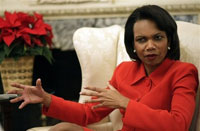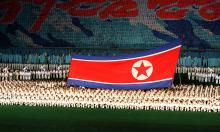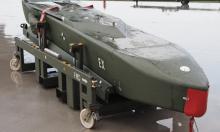Rice says it is irresponsible not to deal with NKorea and Iran's threats
In her interview with The Associated Press, U.S. Secretary of State Condoleezza Rice said that North Korea and Iran would still have to do a lot to be removed from the Bush administration's list of nuclear threats.

In light of last week's retrenchment of U.S. claims that Iran is seeking an atomic weapon and word of new diplomatic and cultural outreach to North Korea, Rice was asked Wednesday whether the United States still considers those nations part of President George W. Bush's "axis of evil."
"They are clearly still states about which there are significant proliferation concerns," Rice said during an Associated Press interview at her State Department office. "It would be very irresponsible not to deal with those dangers," the AP quoted Mrs. Rice as saying.
During the wide-ranging interview, Rice took overarching responsibility for the Blackwater Worldwide debacle in Iraq. "Of course, anything that happens in this department, I'm ultimately responsible," she said.
She would not comment on the specifics of the September killing of 17 Iraqi civilian by private Blackwater security guards working for the State Department, which was the largest of several black marks on Rice's leadership over the past year.
Rice said she believed her staff and the Pentagon had developed adequate rules for contractors to prevent a repeat of that incident, which led the department's diplomatic security chief to resign.
The top U.S. diplomat also said a rocky first session for Israeli and Palestinian peace negotiators on Wednesday was to have been expected.
"Both parties are committed to moving this forward, and they will move this forward," Rice said of the U.S.-backed effort to negotiate a Palestinian state by the end of 2008. "You're going to have some good meetings and some not good meetings."
She condemned Wednesday's assassination of a senior Lebanese military figure but would not expressly blame U.S. adversary Syria. She said she spoke Wednesday to Lebanon's U.S.-backed prime minister, Fuad Saniora, whose government has been paralyzed for months by a bitter political split. Parliament's election of a new president has been postponed repeatedly.
"It's really important that they be able to elect a president ... and Syria and all of Lebanon's neighbors need to play a constructive role and encourage all of their allies to let that happen and not interfere with it," Rice said. "This is a time of testing for Lebanon, but also a test for Lebanon's neighbors, including Syria."
On North Korea, Rice was cautious, speaking a day after the New York Philharmonic announced it would play a concert in Pyongyang, and the week after word of a personal letter from Bush to North Korean leader Kim Jong Il.
"This is not a regime that the United States is prepared to engage broadly" until the North has scrapped its nuclear weapons program, Rice said. "If we are going to engage it broadly, it's clear in the program that we have laid out how that would happen, after denuclearization."
The closed, secretive regime exploded a nuclear device last year but agreed months later to accept a package of economic and energy incentives if it gave up its weapons.
North Korea shut down its main nuclear reactor and has begun to put it out of commission, and U.S. officials have said the work is going well. It is supposed to be complete by year's end.
Rice said neither the orchestra's upcoming trip, which the State Department helped arrange, nor Bush's letter should indicate an easing in the administration's resolve to confront North Korea.
"What matters first and foremost is that we deal with the nuclear weapons programs, all of them, of the North Koreans," Rice said. "It remains a country that is dangerously armed and a considerable threat on both the proliferation front and its own program."
The letter delivered this month offered the possibility for better relations with the United States if North Korea lives up to the deal it made and underscored U.S. expectations. While unremarkable in content, the letter was an unprecedented symbolic gesture to a leader Bush has ridiculed and ostracized.
Rice called it simply part of the "active diplomacy" now under way to resolve the nuclear questions.
At the same time, the classically trained pianist also said she was pleased that at least some North Koreans would be able to get a glimpse of the outside world when the philharmonic performs in the North Korean capital on Feb. 26.
"I think it's a good thing that there are efforts to help North Korea open up to the world," she said. "I don't think that there are any people in the world who are more isolated than the North Koreans and it would be a very good thing if there could be some sunshine into that world."
Iran is an obstacle throughout much of the Bush administration's foreign policy, and the U.S. claim that the clerical regime is trying to build a bomb has been an organizing principle.
In a reassessment, U.S. intelligence agencies last week said Iran once had a weapons program but shelved it four years ago.
Rice brushed aside Iranian President Mahmoud Ahmadinejad's suggestion that the findings of the National Intelligence Estimate, or NIE, could open better relations with the United States.
She said Tehran still needs to account for its past secret nuclear weapons activities and stop nuclear development that alarmed the West. Iran claims its program is meant to produce civilian nuclear energy.
"Since they have embraced the NIE, I assume that are embracing the entire thing," Rice said archly. "And that means that they must have had a weapons program and that means that they have a lot to answer for."
Subscribe to Pravda.Ru Telegram channel, Facebook, RSS!



